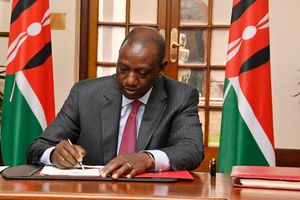
Salaries and Remuneration Commission (SRC) Chairperson Lyn Mengich (left) confers with Cabinet Secretary for Public Service, Performance and Delivery Management Moses Kuria during a media briefing on the National Wage Bill Conference held at Nairobi Safari Club on April 12, 2024.
A proposal by the Ministry of Public Service to transition all public servants from permanent to contract jobs has elicited reactions from players across Kenya’s labour sector, even as the government appears determined for the change.
Debate started following a letter by Public Service Principal Secretary (PS) Amos Gathecha to Solicitor-General Shadrack Mose on Tuesday, titled “Proposal on transitioning all public service staff from permanent and pensionable to contract terms.”
“The above proposal has been made with a view to enhancing productivity and addressing the wage bill. A meeting therefore, has been convened for Wednesday April 24, 2024, 2pm at the fifth floor, Harambee House boardroom,” PS Gathecha said in the letter.
Yesterday, the ministry confirmed that the meeting resolved to form a taskforce to advise the government, on how to undertake the transition “so as to increase productivity in the public service.”
“We are on course. We are committed but more will be coming. The proposal has been made with a view to enhancing productivity and addressing the wage bill,” said Public Service Cabinet Secretary (CS) Moses Kuria.
Head of Ministerial Programmes at CS Kuria’s office, Dr Peter Mbae, said members proposed to the taskforce during the meeting to include representatives from the ministries of Public Service, National Treasury and Labour, Attorney-General, Public Service Commission (PSC), Teachers Service Commission (TSC), Salaries and Remuneration Commission (SRC), National Police Service Commission (NPSC), Retirement Benefits Authority (RBA) and State Corporation Advisory Committee (SCAC).
“The meeting agreed to the formation of a taskforce to look at the issue in a broader context. The matter is to be tabled before the Cabinet at a higher level so as to agree on the issue of the taskforce,” Dr Mbae said.
“What we are proposing is that we want to go the contract way so as to increase productivity even if it means paying more than what the government is currently doing in wages,” he said adding; “at the end of the day, the pension remains.”
But while the government progresses with actions to transition the public service, which has an estimated 970,000 workers across national and county government levels, unionists, the opposition and legal experts yesterday faulted the proposal for its legal shortcomings.
Mr Tom Odege, Union of Kenya Civil Servants (UKCS) secretary- general, condemned the plans by CS Kuria, terming it “reckless” and “impossible to implement.”

The Public Service Commission (PSC) head office at Commission House in Nairobi.
“Changing the terms of employment of civil servants is not a joke. You have to change the Employment Act, labour laws and divorce the county from every international convention covering labour laws. As if that is not enough, the most painful one would be the government would have to pay all those on pensionable terms their accrued pensions before changing the terms. That simply is not affordable,” said Mr Odege, who is also the Nyatike MP.
He asked President William Ruto to rein in his ministers to avoid such occurrences.
“We ask President Ruto to take charge of his government and stop such reckless statements,” said Mr Odege.
Kenya Union of Post Primary Education Teachers (Kuppet) Secretary-General Akello Misori said while the union had not met to take a stand on the proposal, it was ‘reckless’.
“Teachers are not answerable to the CS for Public Service. If the Teachers Service Commission says that our employment terms have changed, then we’ll need to have a very serious discussion with them. The nature of our economy is that you first deal with the high unemployment rates and not cause more problems,” Mr Misori said.
National Assembly Minority Leader Opiyo Wandayi, urged the government to “immediately” abandon any such plans as they would destabilise and adversely affect Kenyans serving as public civil servants.
“The revelation is already causing much anxiety and distress among civil servants and service delivery, which is already at an all-time low, is only bound to get worse,” said Mr Wandayi.
Mr Wandayi faulted the proposal as a cost-saving measure by the government, which was not supported by factual economic data and “is just one of the many erratic policy pronouncements the regime has been known for.”
“Civil servants must not be the scapegoat for the rising wage bill while the government gobbles up billions of shillings every month in unnecessary and unproductive local and foreign travels,” Mr Wandayi, the Ugunja MP said.
As the unions and the opposition faulted the proposal, legal experts in the labour sector raised questions regarding legality of the proposal, since the Employment Act, 2007, requires that a change on an employee’s “the form and duration of the contract” be done in consultation between the employer and the worker.
Labour issues lawyer, Dan Okemwa, says such a change “must be done in writing and the subject-employee(s) must signify his/her consent to the change/revision.”
Human Resource Committee Chairperson at the Council of Governors (COG) Mutahi Kahiga, yesterday said putting government workers on contract would boost productivity in the public service and help control workers on issues such as strikes.
“This is a matter we discussed under former President Uhuru Kenyatta about three years ago during the nurses strike. It was a resolution of the summit that all employees would be put on contract. There is nothing wrong with a contract as long as it is well stipulated, takes care of the employees’ interests,” Mr Kahiga, the Nyeri Governor said.
But even as the debate persists and SRC is indicated as being among members of the taskforce, the Commission’s chairperson, Lyn Mengich, yesterday said SRC had not formally received the proposal from the Ministry OF Public Service, staying mum on what this means for the government.
“When we receive such formal proposal and get an opportunity to look at details of what it is and how it is proposed to be implemented, we will be at a position to respond,” Ms Mengich told the Nation.
Mr John Mbaluto, a legal expert on labour issues, also said a change on a worker’s terms of service would require consent between the worker and the employer: “ The law does not allow an employer to unilaterally change the terms of a contract,” Mr Mbaluto says.
The proposal comes just a week after the conclusion of the third National Wage Bill Conference, where talks of a planned radical review of the public service workforce dominated, as a strategy to address Kenya’s public wage bill that has since crossed Sh1 trillion annually.
“The Head of Public service and my Ministry are partnering to undertake a very serious, radical and surgical reform of our public service. I am not in pursuit of being popular. We will spearhead an initiative that is going to afflict the comfortable but it’s not in vain, it’s so that I can comfort the afflicted,” Mr Kuria said during the wage bill conference debates.
Additional reporting by David Muchunguh













